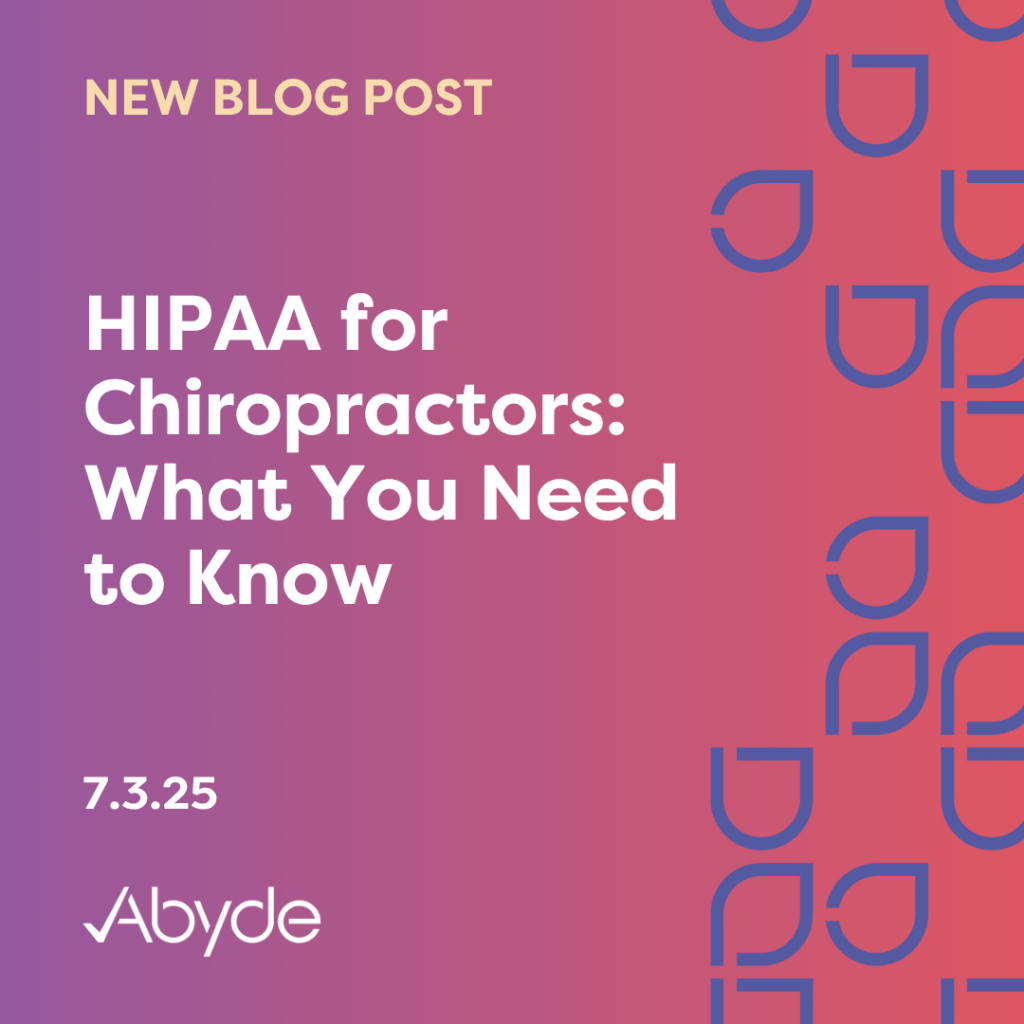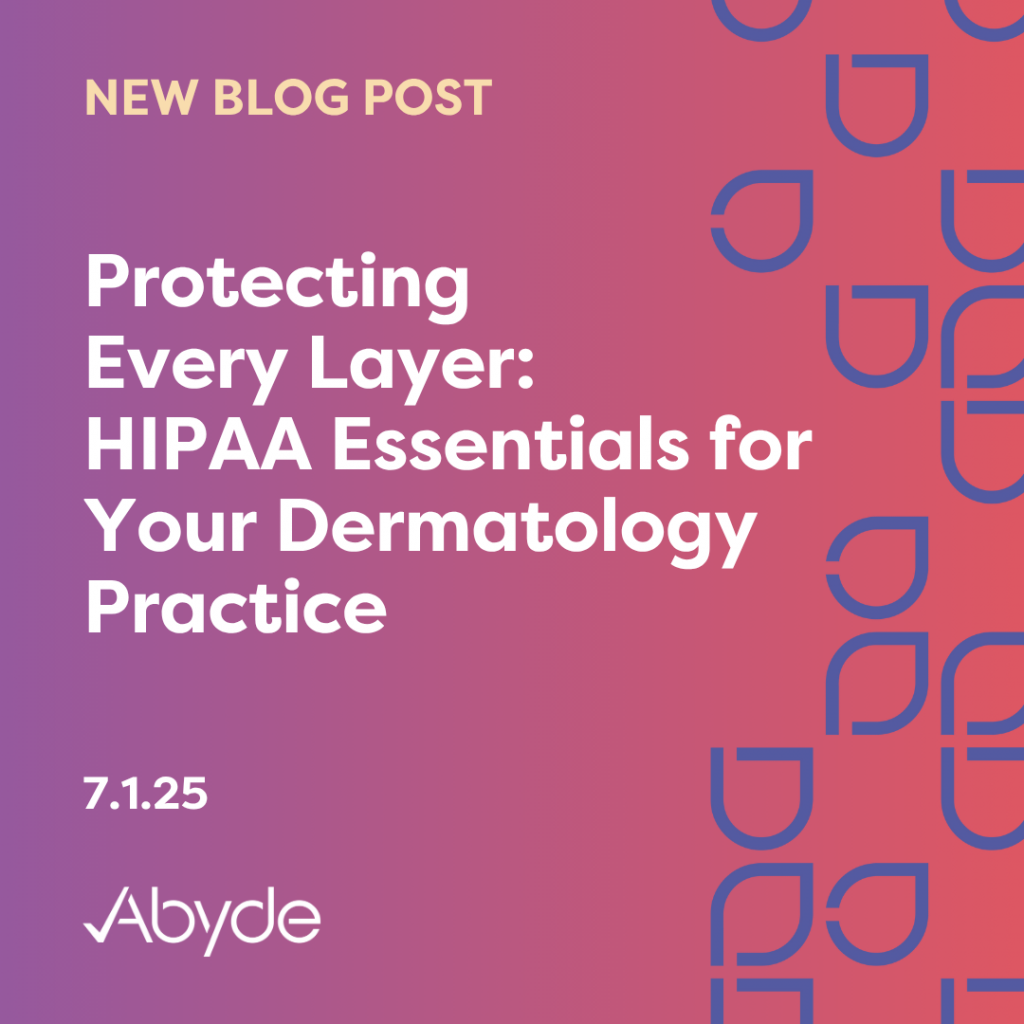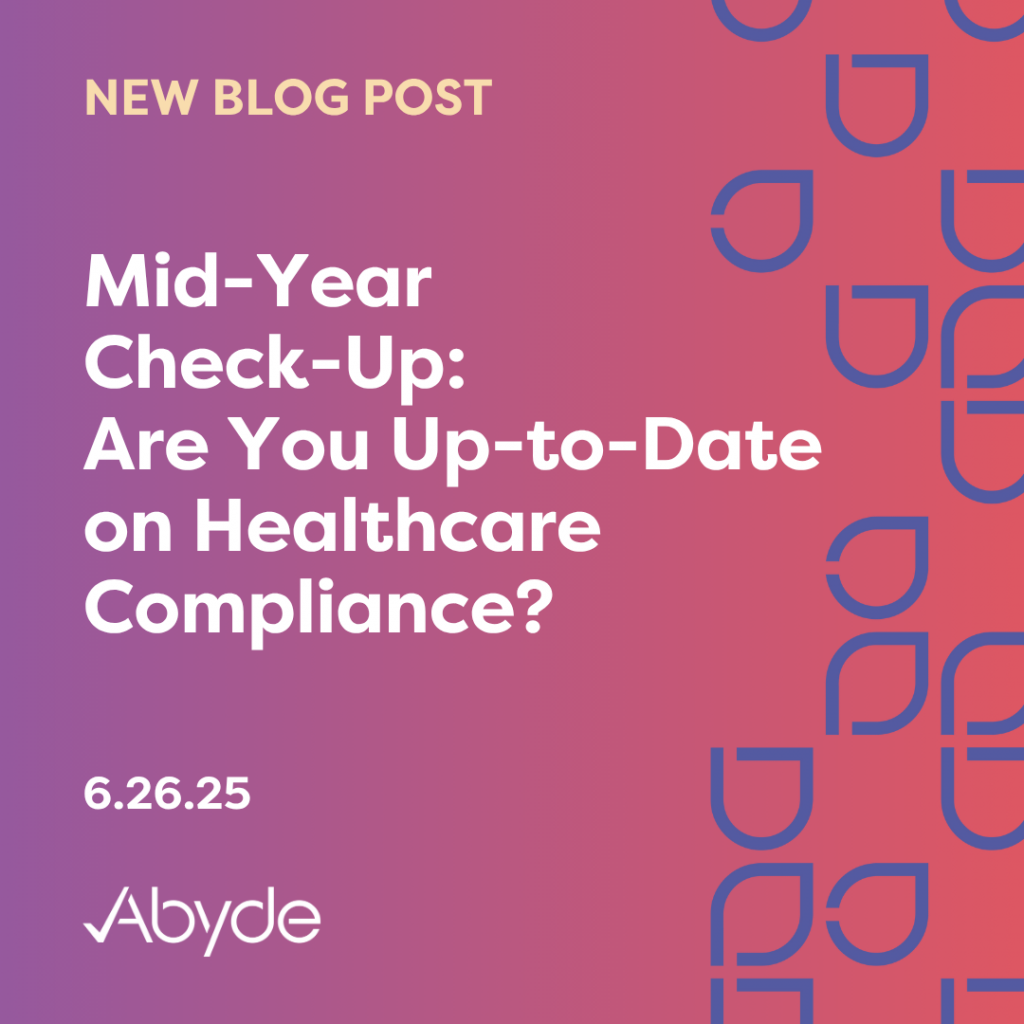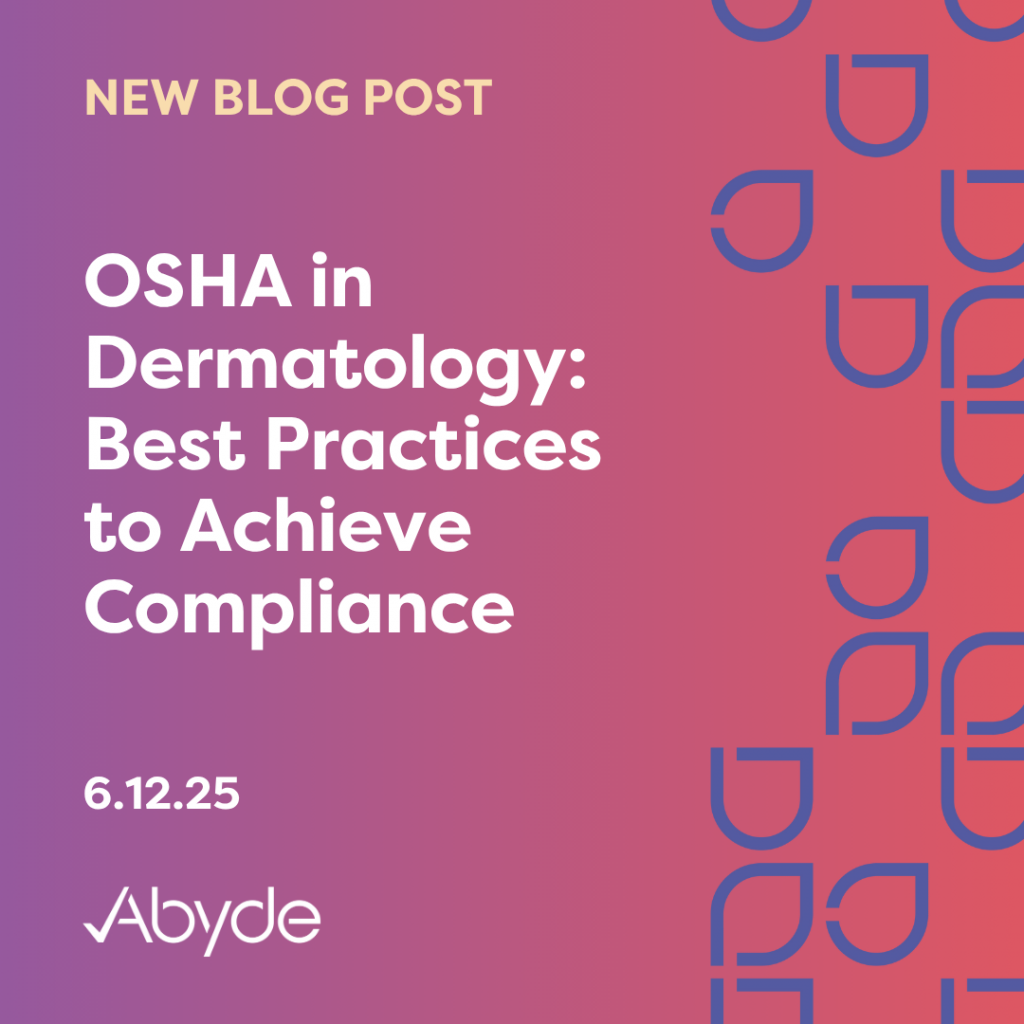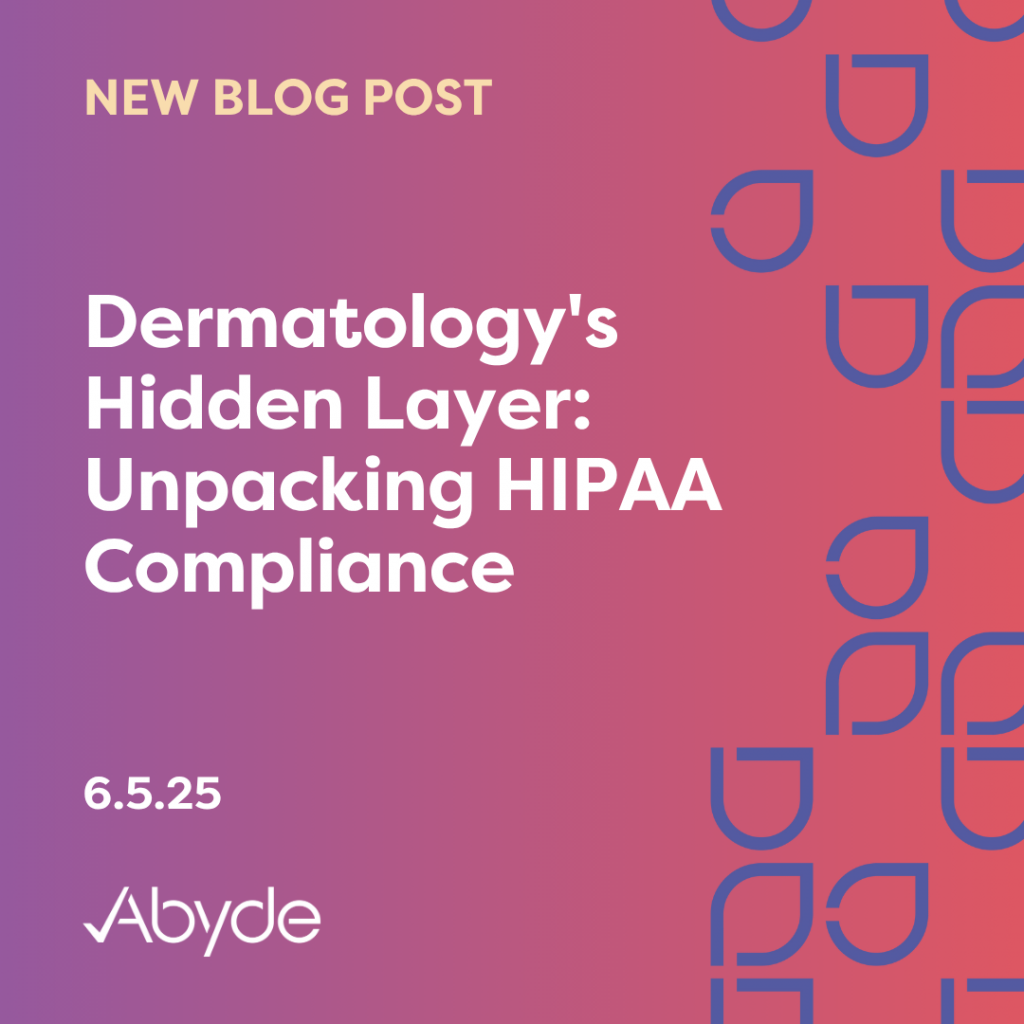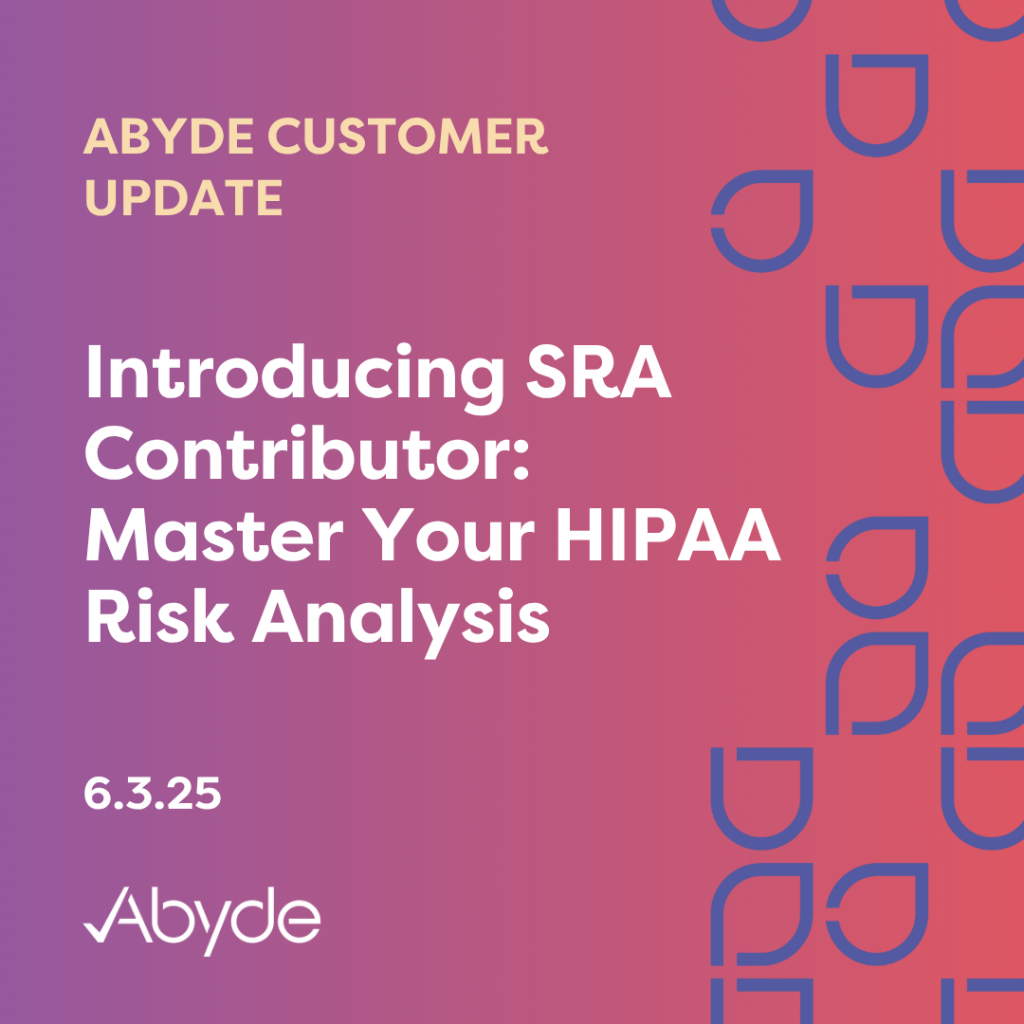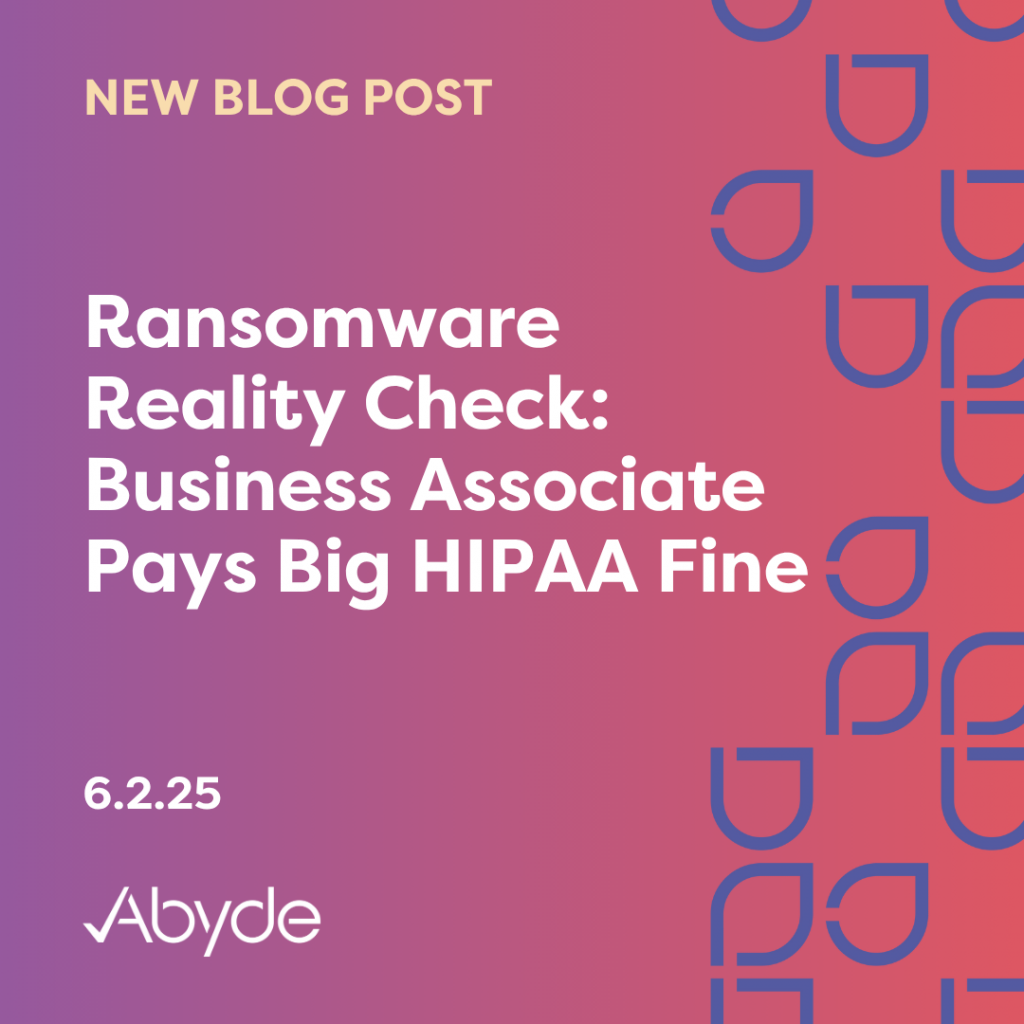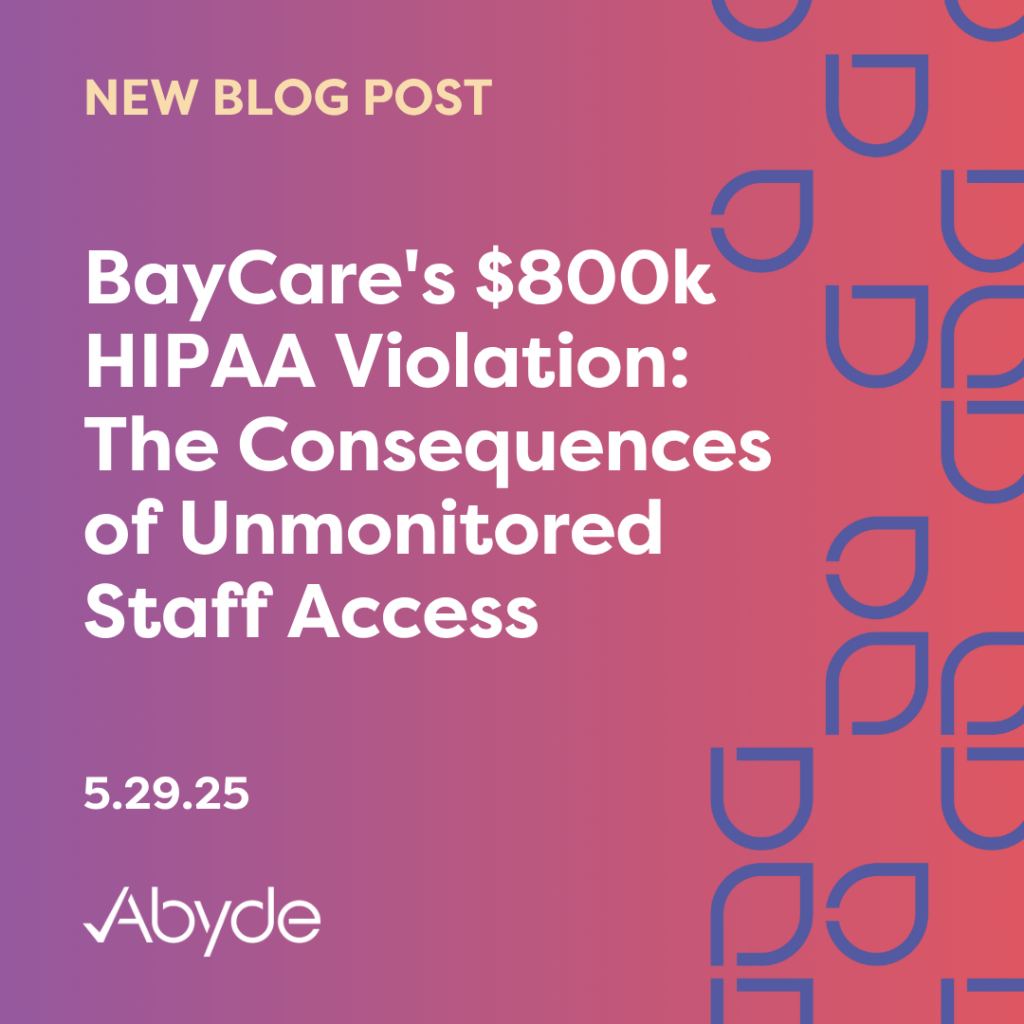July 3, 2025 In chiropractic healthcare, staying aligned with regulations is key. While some might consider Chiropractic medicine an alternative healthcare option, the Health Insurance Portability and Accountability Act (HIPAA) covers the field. That means your practice must secure all patient data transmitted to and from a chiropractic office. Protected Health Information (PHI) encompasses all personally identifiable data, such as names, birth dates, and treatment details, and must be securely maintained. For chiropractic offices, this commonly includes comprehensive treatment plans and spinal X-rays. For chiropractic offices, no matter the size, HIPAA for chiropractors isn’t just a recommendation—it’s required whenever patient data is involved. What does this mean for your chiropractic practice? With the right barriers, you can continue to adjust patients while ensuring the safety of Protected Health Information (PHI), promoting patient trust and transparency in protecting their data. What’s Required for HIPAA for Chiropractors? While solely a yearly training might be what your practice expects, HIPAA for chiropractors requires a much more comprehensive approach. HIPAA has three pillars: the Security Rule, the Privacy Rule, and the Breach Notification Rule. The Security Rule is focused on the administrative, technical, and physical safeguards your practice must have to secure patient data. Under this rule, your practice must complete a Security Risk Analysis (SRA) annually. The SRA is an extensive review of your current practices in your chiropractic office. Everything must be documented, from how your practice checks in patients to how your staff electronically sends patient data. By reviewing this every year, your practice can identify vulnerabilities before they become compliance issues. While this annual review might seem simple, unfortunately, it is a frequent pitfall for practices. When randomly audited, only 14% of healthcare practices could produce a compliant SRA. A missing SRA is one of the most common reasons for HIPAA fines, with over $150 million levied to healthcare practices across America. Your chiropractic practice must ensure that the proper safeguards are in place and that PHI is shared carefully. That’s where the Privacy Rule comes into play. According to the Privacy Rule, health information should be shared as little as possible and only when absolutely necessary. For instance, while you may want to share patient stories, all health information must stay confidential. This rule also mandates that patients provide their health records to those who request them within 30 days of the initial request. This rule requires thorough training with staff, making sure all are aware of the responsibility they must uphold when handling patient data. Lastly, the Breach Notification Rule establishes a required course of action after a breach. Even with the proper safeguards and minimum health information shared, breaches can happen. If patient data is breached, chiropractors must notify impacted patients within 60 days of discovery, regardless of the size of the breach. Depending on the number of patients impacted, the Office for Civil Rights (OCR) must also be notified. Did you accidentally print out and provide someone else’s information to a patient? This must be reported to the OCR by 60 days after the end of the calendar year. A major ransomware attack exposed the information of over 500 patients? The OCR must be informed within 60 days. This also depends on what state your chiropractic office is in, so make sure to check state law and see if your state attorney general must also be notified. Adjusting Your Compliance Program While this might feel overwhelming for your chiropractic office to handle, your organization can easily achieve compliance with the right compliance solutions. Due to HIPAA’s complexity, smart software solutions can walk your chiropractic practice through every step of the process. Software can easily streamline annual requirements, like the SRA, asking intuitive questions to identify compliance gaps proactively. Other requirements, like training, policies, and procedures, can also be found in a centralized hub. By simplifying compliance, your chiropractic office can commit to what it does best: adjusting patients to improve their well-being and quality of life. Meet with a compliance expert today to learn more about HIPAA for chiropractors.
Protecting Every Layer: HIPAA Essentials for Your Dermatology Practice
July 1, 2025 HIPAA violations are not skin-deep. Dermatology practices, like all healthcare practices, are subject to HIPAA legislation. Common HIPAA violations erode reputation and patient trust, potentially costing your practice significant legal fees and fines. Dermatology practices have unique data, like photos of skin ailments and reports of skin biopsies, which must be securely handled. Sharing a picture of an abnormal mole without proper documentation, even if it looks harmless, is a HIPAA violation. Why? This is because the image includes identifiable health information about your patient. The good news? Frequent HIPAA pitfalls can easily be prevented with the proper safeguards and education. Being aware and implementing the right proactive safeguards secures your practice. Social Media 101 Before-and-after patient photos can be a powerful marketing tool on social media, but mishandling them could attract unwanted attention from the Office for Civil Rights (OCR). It’s totally normal to be proud of the great results you achieve for your patients. However, if you plan to share how your treatment helped a patient publicly, you must have that patient sign a media consent form. This form explicitly grants permission to share their healthcare procedures or results online. Beyond that, your practice must have a well-defined multimedia policy outlining how social media is handled. This ensures your entire staff is equipped and aware of their responsibilities regarding sharing information online, keeping everyone compliant, and protecting patient privacy. It’s also important to regulate your dermatology staff’s communication with patients on social media. While a patient may leave a positive review about how a chemical peel treatment made them look younger, you cannot confirm or deny whether that patient visited your practice. If you want to use a favorable review in your social media marketing, make sure the patient has signed the media consent form. Even a negative review can lead to a HIPAA violation if you’re not careful. While it’s tempting to defend your practice publicly, the cost of a violation far exceeds the initial frustration. For instance, one practice faced a $10,000 fine for disclosing Protected Health Information (PHI) on Yelp. The right move would have been to move the conversation offline and communicate with the patient privately through a secure channel. Staying Ahead: Security Risk Analysis One of the most common fines is missing a vital piece of proactive compliance. The Security Risk Analysis (SRA) is a thorough assessment of all the safeguards your practice has in place to secure PHI. The minimum annual SRA must be completed before and after a HIPAA breach, showcasing your practice is aware of vulnerabilities and documenting how they are addressed. This isn’t an isolated issue; it’s a widespread compliance gap, with only 14% of healthcare practices able to produce a compliant SRA during random audits. The recent case of a dermatology organization that faced an investigation after a substantial ransomware breach. The incomplete SRA discovered during the investigation led to a hefty $250,000 fine for the practice. It’s a common misconception that fines are solely a consequence of ransomware attacks. However, the true underlying reason for a fine is the failure to implement appropriate preventative safeguards. While ransomware attacks and cybercrimes can certainly occur despite even the most robust safeguards, a practice’s preventative and reactive response and ability to mitigate risk swiftly determine whether a fine is levied. Improper Paper Trails The entire lifecycle of PHI, from generation to deletion, needs to be handled securely. This includes properly shredding and disposing of records. Any image of a patient’s skin, old samples, etc., must be disposed of securely. First, records need to be kept for at least six years, but once disposed of, they cannot be traced to patients and must be destroyed entirely. Simply putting records in the trash isn’t going to cut it. In fact, Business Associates can handle data destruction for your practice. A dermatology practice was fined for improper disposal. Empty specimen containers, with PHI on the label, such as patient names, dates of birth, and more, were thrown in unsecured trash. After discovering that this disposal was typical for the dermatology organization for years, the practice was fined over $300,000. How to Avoid Common Dermatology HIPAA Violations The right HIPAA compliance program can avoid these common missteps. Proactive compliance, including thorough training and a maintained SRA, is key to the success of your dermatology practice. While handling your practice’s compliance program might feel overwhelming, compliance solutions can streamline this process. Intelligent software can easily pinpoint and address common violations in a centralized compliance hub. By maintaining control and proactively addressing compliance gaps, your practice can achieve peace of mind. Meet with a compliance expert today to learn more about simplifying HIPAA compliance for your dermatology practice.
Mid-Year Check-Up: Are You Up-to-Date on Healthcare Compliance?
June 26, 2025 Healthcare compliance is an ever-evolving landscape, with new initiatives and updates announced to better protect patients and staff. As the year progresses to its midpoint, it’s crucial to seize this opportunity to stay informed on the latest developments in the field. HIPAA and OSHA both have new significant updates that will directly impact practices. New HIPAA Security Rule Legislation In December 2024, the Office for Civil Rights (OCR) released proposed updates to the HIPAA Security Rule. One of the pillars of the Health Information Portability and Accountability Act, the Security Rule focuses on the safeguards that must be deployed to keep Protected Health Information (PHI) secure. In response to the rise of large breach ransomware attacks, which have nearly tripled in the last several years, the OCR is increasing cybersecurity requirements when handling patient PHI. For instance, under this new legislation, some new requirements include an asset log, network segmentation, and multi-factor authentication. These requirements are all heightened precautions when protecting patient data. Under this new legislation, the vendors your practice works with will also experience increased scrutiny. For example, under this proposed rule, Business Associates (BAs) now must have their compliance practices verified by a cybersecurity expert annually. BAs must also alert Covered Entities within 24 hours after a breach with a contingency plan. These soon-to-be added responsibilities demonstrate the vital role BAs play in protecting patients. The comment period for these updates wrapped up in March, and the OCR is reviewing all 4,000 comments before a final rule is announced. Workplace Violence Prevention Legislation When healthcare workers are five times as likely to experience workplace violence, federal legislation is soon to follow. While Workplace Violence Prevention currently falls under the General Duty Clause of OSHA, or the basic requirement of providing a safe workplace for employees, state-level legislation focused on this continues to go into effect. State legislation regarding this vastly differs. Nearly every state has heightened charges for attacking a healthcare worker, being classified as a felony rather than a misdemeanor. Still, now many are requiring specialized training and reporting requirements specifically addressing violence in healthcare workplaces. For example, California, Texas, and Virginia all have comprehensive healthcare workplace violence plans. California even requires near misses and threats to be logged for the state. While federal legislation has not been released yet, a Notice of Proposed Rulemaking (NPRM) will likely be announced this year. HIPAA Audit Program & Risk Analysis Initiative The OCR has reintroduced the HIPAA Audit Program, randomly selecting HIPAA-regulated entities and reviewing their current HIPAA programs. The last time this program was in effect was in 2017. The last round of audits found that 86% of Covered Entities could not produce a compliant Security Risk Analysis (SRA) when prompted by the OCR. The SRA is a thorough assessment of the safeguards and routines currently in place to secure PHI. Practices frequently overlook the Security Risk Analysis (SRA), yet it’s a primary defense, proactively addressing concerns. In fact, the OCR’s October 2024 Risk Analysis Initiative specifically targets practices that fail to complete an SRA, and this initiative has already resulted in nearly a million dollars in fines. Right of Access Fines Improper patient records release continue to be a common pitfall for practices. Records must be provided to patients within 30 days of a request. With over 50 enforcements of the Right of Access Initiative, millions of dollars have been paid by practices. This easily preventable fine highlights the significant impact of patient complaints (the leading cause for investigations) and the OCR’s diligence in addressing Right of Access violations. Getting Prepared for the Rest of the Year While it feels like new initiatives are frequently being announced by the OCR, it is your practice’s responsibility to implement new updates. With the right HIPAA compliance program, smart software can ensure your practice will always be prepared, with new legislation instantly updating in the software. To learn more about what’s next in HIPAA, watch our latest webinar regarding current events in HIPAA here.
OSHA’s Rapid Response: Why Every Practice Needs a Safety Culture
June 19, 2025 The success of your practice hinges on the safety of your staff. When staff feel unsafe, OSHA quickly demonstrates its commitment to staff protection. A recent healthcare OSHA fine highlights how efficiently OSHA complaints are handled. Opulent Pediatrics faced expedited penalties following a staff complaint, just months after the initial complaint. From the case opening in March to its resolution in June, OSHA underscored the severity and importance it places on staff complaints. Complaints are also the most common way HIPAA investigations are initiated. This rapid response showcases the need for practices to provide a safe work environment and foster a culture of compliance, empowering staff members to communicate needs and concerns. What Happened? In March 2025, a staff member of Opulent Pediatrics sent a formal complaint to OSHA due to unsafe working conditions. The Roanoke regional office investigated the pediatric practice unannounced, not providing time for the practice to address any concerns. Following their investigation, it was discovered that the practice violated several safety requirements, such as bloodborne pathogen safety, improper medical services, or missing first aid unavailable to staff, improper handling of wiring and equipment, and insufficient hazard communication documentation. After the investigation, by April, OSHA noted seven citations and issued an initial penalty of over $14,000. It’s inferred that the practice was willing and cooperative, with the final fine totalling over $2,000 by the abatement date in May. Protecting Staff in Healthcare While Opulent Pediatrics dodged a more significant fine, this enforcement action demonstrates OSHA’s swift investigative response to complaints. From the initial investigation to its conclusion, the case only took three months. OSHA can and will investigate without notice, so ensure your OSHA program documentation is readily available. With the right tools, ensuring staff safety can be simplified. In this case, training and proper documentation could have avoided these fines. Consider how an intelligent OSHA software solution centralizes training, such as for bloodborne pathogens, hazard communication, and all other OSHA documentation, making it easily accessible to every staff member within a compliance hub. Moreover, by prioritizing safety in your practice, staff can feel empowered to communicate concerns. To learn more about streamlining OSHA compliance in your healthcare practice, schedule a consultation with an expert today.
OSHA in Dermatology: Best Practices to Achieve Compliance
June 12, 2025 While working in a dermatology office might have you focused on taking care of your patients’ skin, your health should be the first priority. It’s easy to incorrectly assume a dermatology office is a relatively “safe” healthcare environment. After all, we’re not typically dealing with the same acute emergencies as an ER. Dermatology presents many challenges when working with patients, such as lasers, sharp instruments, chemicals, potential exposure to bloodborne pathogens, and more. With these unique challenges, your practice must be aware of the safeguards the Occupational Safety and Health Administration (OSHA) requires. More than Skin Deep: Facility Risk Assessment An annual Facility Risk Assessment (FRA) is the foundation of your OSHA compliance program. The FRA is a thorough assessment of the healthcare hazards your practice might face. This assessment spans from your staff is trained, to unique equipment you might use, how situations are prevented, and even how management handles workplace safety. Since this is an annual requirement, this assessment must be kept current. If your practice introduces anything new that might heighten risk, this needs to be documented. For instance, if your practice begins offering laser treatments, this must be mentioned in the FRA and also staff must be trained on how to use it safely. By reviewing and addressing potential vulnerabilities in your practice, you can mitigate risks and ultimately keep patients safe. Personal Protective Equipment (PPE) in Dermatology: Your First Line of Defense While you advise patients on sun protection, remember that your staff’s skin needs protection, too. Always ensure that it remains covered with Personal Protective Equipment (PPE). PPE, like gloves and masks, are essential barriers that keep your team safe. Your practice must supply this PPE and provide comprehensive training on how to use it correctly. For instance, when a staff member is with a patient, a new set of gloves is always required. From putting them on to how they must be disposed of, these are all critical ways to keep staff members safe. Depending on the treatment, your staff may also need eye protection. As a result, it’s essential to review all available forms of PPE with staff before they start working with patients. Dermatology Laser Safety When it comes to lasers in your dermatology practice, preparation is paramount. It’s not enough to just have the equipment; you need to ensure every team member is properly trained and fully aware of the risks associated with these powerful devices. Once again, proper PPE is vital, such as eyewear and gloves. Additionally, the room where the laser is being used must adhere to safety guidelines, including not having any reflective surfaces for the laser to shine off. Your practice should designate a Laser Safety Officer to oversee and enforce compliance. This staff member is likely already your OSHA Safety Officer, or OSO. This Laser Safety Officer needs to ensure staff is routinely trained on lasers, especially if new equipment is being used. For staff safety, the laser device must be off when not in use. While laser treatments offer dermatologists innovative possibilities, proper staff training always remains crucial. Keeping Your Dermatology Practice Safe Ensuring the safety of your dermatology practice is not just about compliance; it’s about fostering a secure environment for both your dedicated staff and your valued patients. Your practice can proactively address potential hazards by diligently conducting annual facility risk assessments, consistently utilizing appropriate personal protective equipment, and prioritizing comprehensive training. With the right solution, your practice can streamline these requirements. Smart software can utilize the answers from your FRA and provide thorough policies and procedures and recommended training. A safe practice is a successful practice. To see how you can streamline compliance for your practice, schedule a meeting with a compliance expert today.
Dermatology’s Hidden Layer: Unpacking HIPAA Compliance
June 5, 2025 When ensuring your patients have clear, healthy skin, you might not realize the thorough administrative requirements your practice needs to follow. HIPAA, or the Health Insurance Portability and Accountability Act, must be upheld by all Healthcare providers and their Business Associates (BAs) who handle and transmit Protected Health Information (PHI). PHI is sensitive information about a patient, such as their Social Security Number, birthdate, medical records, and more. If PHI ends up in the wrong hands, the information could easily be misused, making healthcare a prime target for hackers. For dermatologists, every piece of information related to a patient’s skin condition – from their name and date of birth to their diagnosis, treatment plan, and even before-and-after photos – falls under HIPAA’s umbrella. Following HIPAA laws doesn’t just protect your practice from fines – it also keeps your patients safe and builds trust. What is Required for Dermatologists? There’s a lot more required than just yearly training. Dermatologists must follow the three HIPAA rules: the Privacy Rule, the Security Rule, and the Breach Notification Rule to be HIPAA compliant. The Privacy Rule dictates how PHI can be shared, specifically the minimum amount of information necessary to handle transactions. Information should only be shared with staff who actually need access to it. Staff access to PHI must be monitored and removed when staff leave the practice. The Privacy Rule also details patients’ Right of Access, requiring practices to provide health records to a patient within 30 days. The Security Rule focuses on the technical, physical, and administrative safeguards that must be in place in your dermatology practice and includes the required Security Risk Analysis (SRA). The SRA is an extensive annual review of your practice’s protective barriers in case a situation were to occur. SRA questions include information about physical alarms and locks your practice might have, and how email is handled in your practice. By addressing any vulnerabilities before a breach occurs, your practice can more easily mitigate risk. Leaving this document incomplete can have severe consequences. For instance, a dermatology organization without a compliant SRA was fined $250,000 following a breach. The Office for Civil Rights (OCR), which enforces HIPAA, also enacted the Risk Analysis Initiative. This new initiative focuses on and fines practices missing an SRA after being alerted of a breach. In addition to the SRA, dermatologists must complete Disaster Recovery Plans for their practices. The Disaster Recovery Plan builds a contingency plan in case a natural or man-made disaster, such as flooding or a cyber-attack, occurs. These documents lead to the policies and procedures your practice must have that are easily accessible to staff. With policies and procedures, everyone in your practice will know what is expected and unacceptable in your organization, mitigating risk and providing a guide for every situation. In addition to this, training is also required under the rule for all new employees and yearly. Expect an update to the Security Rule soon, and you can find the new details here. The last rule of HIPAA is the Breach Notification Rule. This rule is observed after a breach, ensuring that all involved parties are properly informed following a breach of PHI. After a breach of any size, affected individuals must be notified within 60 days of the breach’s discovery. If it is a small breach, the OCR must also be informed by the end of the year. However, the breach is considered large if more than 500 patients are affected. For large breaches, while patients must be notified within 60 days, the OCR also does. The media must also be notified, with a press release going out. Depending on the state, the Attorney General must be made aware of this, too, so it is vital to review state law as well when facing a breach. Streamlining Compliance in Your Dermatology Practice Given the ever-changing nature of the HIPAA landscape, the brief overview of requirements provided here is just a starting point. While it might feel overwhelming, it’s critical to maintain a compliant dermatology practice. There are options to simplify HIPAA compliance. Smart software can efficiently assist in compliance management. The pillars of HIPAA compliance, such as the SRA, Disaster Recovery Plan, training, documentation, and more, can all be resolved with the right software platform. By using a smart solution, you can proactively pinpoint gaps and stay on top of your compliance management, freeing you up to focus on caring for patients’ skin. To see how your dermatology practice can streamline HIPAA for your practice, meet with a compliance expert today.
Introducing SRA Contributor: Master Your HIPAA Risk Analysis
June 3, 2025 Have you ever been stumped by a HIPAA Security Risk Analysis (SRA) question because you didn’t know the answer? Even the most seasoned HIPAA Compliance Officers encounter administrative and technical security questions outside their area of expertise, and that’s completely normal. Remember, you’re not expected to have all the answers. So, how are you supposed to get the right answers for the questions you don’t know from those who do? Abyde’s latest update, SRA Contributor, helps you get the necessary answers. This feature allows you to send questions internally to other Abyde users (at your practice) or externally to trusted contacts of your Business Associates (BAs), allowing you to complete your SRA confidently. The Users section has now been updated to include both Users and Contributors. Once in this section, click the SRA Contributor tab to add external individuals, such as your IT partner, who can assist in answering SRA questions. Then, complete the SRA. We encourage users to mark uncertain questions with ‘Don’t Know’. Once the SRA is complete, Abyde users can access the SRA Contributor feature from their Scorecard module and securely send any questions as needed. Hit the Abyde Flag icon to the right of any question on your Scorecard to activate the SRA Contributor pop-up and select your Contributors. As a reminder, you can add a note to any question for your Contributors. Once flagged, the question(s) are batched and ready to be sent. Abyde recommends reviewing any and all questions for Contributors and sending them in one batch to reduce the number of emails. After all questions are flagged, send them together by hitting the send icon on the Contributor line below the question or from the global SEND button at the top of the Scorecard module. Once sent, your SRA Contributors (and other Abyde users) will receive an email to the secure SRA Contributor Portal. The Contributor Portal includes all flagged questions. Your Contributors can answer your questions, add notes, and send their responses to you once they complete the portal. From there, you will receive an email notification that your question has been answered and is ready for review. Then, you can either reject or approve an SRA Contributor’s answers. If approved, their answer and note (if present) replace your initial response on the SRA. If rejected, you can send the question again to other contributors or manually change the answer yourself. SRA Contributors’ answers and Contributor Portal links (if they never answered the question) can also be deleted from the Scorecard by clicking the Trash Can icon. Why This Matters A thorough and accurate Security Risk Analysis (SRA) is paramount for safeguarding patient data and ensuring compliance. It is the foundation of a compliant practice. The SRA Contributor enables you to complete the SRA more efficiently and confidently, enhancing collaboration with your business associates and other Contributors who manage the more technical aspects of your practice. This ensures that the required SRA is completed accurately and thoroughly, giving you confidence in the integrity and completeness of your answers. To learn more, contact our support team at support@abyde.com, or call 1.877.816.1620.
Ransomware Reality Check: Business Associate Pays Big HIPAA Fine
6/2/2025 Did you know Business Associates (BAs) are at risk for ransomware attacks just as much as Covered Entities? Ransomware attacks disproportionately affect healthcare organizations, with malicious actors looking to exploit Protected Health Information (PHI). When PHI includes sensitive information such as Social Security Numbers, addresses, phone numbers, and more, it provides someone with a lot of information to use for the wrong reasons. A medical billing BA in Massachusetts, Comstar, LLC, recently experienced the fallout of a ransomware attack. Trusted with the PHI of over 70 practices, the organization did not have the proper safeguards to mitigate risk after a cybercrime. Part of this was a missing Security Risk Analysis (SRA), or a thorough assessment of an organization’s potential vulnerabilities. This latest enforcement represents the responsibility of BAs to uphold their commitments and for all HIPAA-regulated entities to complete and maintain an SRA. What Happened? In May 2022, a malicious actor intruded Comstar’s network servers. Comstar was unaware of this intrusion for several days. In the meantime, the hacker encrypted nearly 600,000 patient records with ransomware. Even though these patients weren’t directly Comstar’s, they assumed the responsibility of protecting their data. While it is not public what steps Comstar took to mitigate risks after the initial ransomware breach, it was discovered that the organization did not complete an SRA. This assessment is at the foundation of a compliant practice and is a requirement of HIPAA. After this discovery, the organization was fined $75,000 and put under a Corrective Action Plan (CAP), or government monitoring, for two years. This assessment is at the foundation of a compliant practice and is a requirement of HIPAA. Recently, the Office for Civil Rights (OCR) has sharpened its focus on this commonly missed requirement with the latest Risk Analysis Initiative. This fine is the 9th enforcement of this initiative. Streamlining the SRA with Software When less than 20% of BAs could showcase a compliant SRA when being audited, completing the SRA is unfortunately a common oversight by regulated entities. Additionally, this is a responsibility of both Covered Entities and BAs, and both parties must carefully handle PHI. With smart software, BAs can easily streamline the SRA and complete the assessment that pinpoints common vulnerabilities organizations face. By simplifying the SRA, intelligent solutions can empower an organization to cultivate a culture of compliance for its staff, securely meet requirements, and handle PHI. To learn more about how your organization can easily complete the SRA, meet with a compliance expert today.
Ahead of the Curve: Abyde’s Latest Updates Keep You Covered
May 29, 2025 It’s been a pivotal year for healthcare compliance. The largest ever healthcare data breach occurred at the beginning of 2024, and now the HHS Office for Civil Rights is reviewing and soon implementing new HIPAA legislation. Don’t worry; as an Abyde customer, we’ve got you covered. Our cloud-based software is rapidly updated with features to address the latest legislation. To help you keep up with all the compliance changes, Abyde is committed to providing an adaptable software platform to maintain compliance within an ever-changing regulatory environment. We’ve compiled a quick rundown of the most significant Abyde updates from the past year. These updates assist your practice in automating, simplifying, and streamlining compliance. Business Associate Accountability Abyde expanded our ecosystem with a new product, HIPAA for Business Associates, to serve the vendors of Covered Entities. Even if they don’t directly care for patients, they still play an essential role in keeping that information safe. Like your Abyde experience, Business Associates (BAs) now have a centralized hub for HIPAA responsibilities. With the Abyde for Business Associates solution, your BAs can take control of their compliance program. Your practice can also have peace of mind that the businesses you work with take compliance seriously. We’ve also made it easier to manage Business Associate Agreements (BAAs) within our Covered Entities software. Now, BAAs are dynamically updated to be location-specific. BAs can be assigned to one or more locations within multi-location accounts. This helps everyone stay accurate and accountable when handling PHI. Additionally, when completing your Security Risk Analysis (SRA), your BAs can now assist in answering questions with the new SRA Contributor feature. With the SRA Contributor, BAs or fellow staff can help answer questions you may be unsure of, allowing your practice to receive and review answers while completing the SRA. This enables your BA to provide support with technical questions and permits your practice to complete the SRA more quickly and accurately. Staying Ahead of the Latest Legislation Abyde is committed to proactively updating our software to maintain your practice’s compliance with evolving healthcare regulations. We’ve kept this commitment with our Compliance Task Force team, a team of our experts dedicated to thoroughly addressing new legislation. Our Compliance Task Force reviews and researches new legislation in advance, ensuring Abyde’s software remains compliant with the latest laws. One example is recent legislation on workplace violence. As healthcare staff is five times as likely to experience workplace violence compared to other workers, federal OSHA legislation is incoming. Abyde quickly updated its platform to reflect Cal/OSHA’s new Workplace Violence Prevention legislation, which requires substantial changes to compliance programs, such as new logs and training. Because Cal/OSHA’s rules frequently become federal standards, Abyde users gain the advantage of early compliance, ensuring they’re ready for future national mandates. In addition, we provided a webinar about these new requirements, ensuring all were aware of their responsibilities. Another major recent legislative change was introducing a reproductive healthcare attestation form. Initiated by the Biden administration, reproductive healthcare is handled separately, requiring additional paperwork to share PHI. While this update has been contested, practices are prepared with the additional paperwork in the Forms section of the Policies & Procedures module. Abyde software is tailored to federal and state laws. For example, we recently adjusted the New York Breach Notification Policy based on recent state regulations. Overall, Abyde’s software is equipped to deliver necessary updates promptly in response to new legislation. With new incoming legislation, like the updated Security Rule, it’s vital to use software that makes change easy. Training Tailored to Your Schedule We understand your time is valuable, so we’ve made managing your team’s HIPAA training easier than ever. Abyde’s training overhaul in the HIPAA solutions allows HCOs to schedule training. Training for the entire subscription year is now available up front, allowing HCOs to schedule it at their earliest convenience. If you prefer Abyde’s automated scheduling, worry not! The original cadence remains in place as a default. The new updates, tailored to your practice, also allow for training to be resent. For example, after a breach, reviewing training is key, as is ensuring staff are retrained on best practices to mitigate future risk. New training has also been revolutionized into three bite-sized pieces, making it more palatable for viewers to retain the information. The update also included structuring insights into three tabs in the training section in both HIPAA solutions to organize the videos easily. Abyde’s streamlined and simplified training process provides flexibility for your practice, empowering your team to create a training schedule that fits your availability. Reduce Risk for Your Practice Your practice was likely affected by the Change Healthcare Breach in the past year. This massive breach was a wake-up call for everyone in the healthcare industry. The fundamental security oversight was the absence of multi-factor authentication. As a result of this discovery, Abyde implemented MFA to access our solutions, following best practices. Now, a unique code will be sent when attempting to log into Abyde’s software. While this update might add a few seconds to your login routine, this extra layer of protection keeps your account secure. It also serves as a great reminder to review passwords and add MFA when possible. This additional cybersecurity measure will also likely become required as part of the new Security Rule updates. Making Abyde Even Easier If you ever need a quick refresher on the Abyde HIPAA for Covered Entities solution, we’ve recently implemented in-app explainer videos. These videos can be found throughout the software, providing a short video on each module. Get the answers you need instantly, right where you need them. These short clips ensure everyone feels confident navigating the solution, which means less time searching and more time focused on patient care. And remember, if you ever need any compliance assistance, the subscription includes access to our compliance experts. Abyde Updates – Protecting your Practice It’s been a busy year for HIPAA, with legislation updates,
BayCare’s $800k HIPAA Violation: The Consequences of Unmonitored Staff Access
May 29, 2025 A successful practice is built upon a strong foundation of well-trained and aware staff. Protecting patient data is a critical responsibility for healthcare staff. Data breaches involving Protected Health Information (PHI) can occur in many ways, but the foundation of security lies in a workforce committed to safeguarding it. A Florida healthcare provider, BayCare Health System, experienced the consequences of improper disclosure of PHI due to a complaint and a noncompliant staff member in the latest HIPAA fine. Acting Director of the Office for Civil Rights (OCR) Anthony Archeval commented on the importance of managing staff access, saying, “allowing unrestricted access to patient health information can create an attractive target for a malicious insider.” What Happened? In 2018, an unnamed complainant visited St. Joseph’s Hospital, a facility under the BayCare Health System, for an appointment. After treatment, she received communication from an unknown contact who sent the complainant photos of her medical records and a video of a BayCare associate scrolling through her file as well. This communication led to a complaint filed with the OCR. Several years of legal interactions and investigations by the OCR resulted in an $800,000 settlement six years later. After the investigation, it was found that BayCare failed to have procedures and policies for handling ePHI, failed to reduce risks, and did not review staff access. This nearly million-dollar fine resulted from a malicious insider, insufficient documentation, and an oversight of staff privileges. Reviewing staff access is vital for protecting patient data. By monitoring staff activity, you can ensure that PHI does not end up in the wrong hands. Additionally, when providing staff with access to PHI, confirm that access is necessary to complete essential job tasks. This falls under the Minimum Necessary Standard within the HIPAA Privacy Rule, which enforces that disclosed PHI is only shared for an authorized and required purpose. Staff must be thoroughly trained in their responsibilities before accessing PHI, and policies and procedures regarding handling PHI must be readily available for staff to review. While this situation did not lead to jail time, it is not unheard of in the medical field, so staff must also be aware of the consequences. Training and Monitoring Staff with Abyde Smart compliance solutions streamline training, policies and procedures, and monitoring access, creating a culture of compliance that protects your organization from malicious insiders. With an intelligent platform managing compliance, you can dynamically generate unique policies and procedures in seconds, automating this task without human error. Additionally, a centralized compliance hub allows staff to review documentation before working with patients and refer to it if there is any confusion. Access logs can also be found in this hub, which keeps staff accountable when they review patient PHI. With intelligent solutions, proactive compliance is made easy, encouraging staff to take their HIPAA responsibilities seriously. Speak with a compliance expert today to learn more about how compliance can be simplified for your practice.
